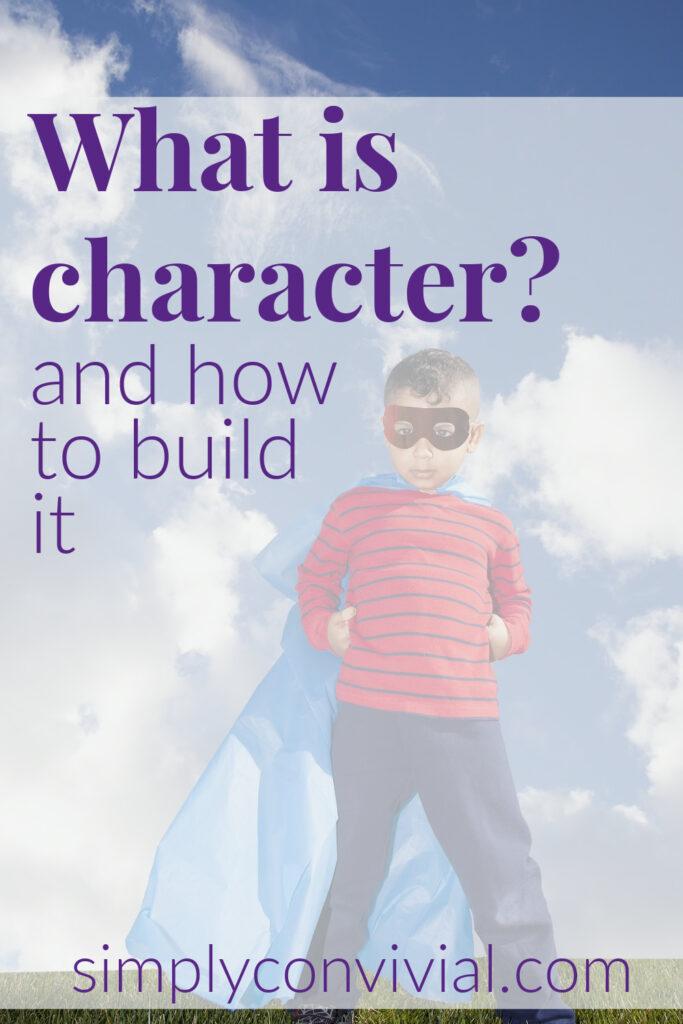Character is one of those words we toss around often. Too often, we do so without a clear understanding of what it is.
We say we care about character, perhaps even homeschool for the purpose of shaping our children’s character, but what exactly does that mean and how exactly do we go about such a task?
The dictionary defines character as:
n.
the mental and moral qualities distinctive to an individual
Suddenly, we are taken aback.
Wait? Mental qualities are a part of character?
Our character is not simply our reputation; it is not something that we protect by being nice and playing safe.
Our character is not simply how we treat others, although that is a large part of it.
Our character is not something that applies only when playing with others, doing chores, or when tempted to cheat or steal. Character does not stop at being a Good Citizen or even a Good Samaritan. Character would be important and on display, even were a person the only person alive on earth.
Our character is comprised of all our mental and moral qualities. Whatever we do, how ever we do it, our character is both evident and active.
What – who – is our character?
And yes, we should be speaking of our character, not our children’s character, because we have a much higher responsibility for our own choices than for other’s choices, and it is our own character that will teach far more than words or actions directed at shaping another’s.
When we grasp the full depth of character, we realize that it is truly the most important element of education.
It is so important, in fact, that we cannot neglect history, science, math, spelling, or anything else, for all these play a part in developing, shaping, and exercising character.
To think that character is its own subject that can be taught with a textbook or flashcards or marbles in a jar, to think that to focus on character we must pause our lessons, is to misunderstand the true nature of character.
Our lessons and our lifestyle both together are the furnace in which character is forged. To put out the fire is to kill the character, not focus on it. To lessen the heat is to soften, not strengthen.
Character is learned by parroting and by practice rather than by precept and principle.
Character comes through imitation.
What the children need is not a lecture or a devotional, not a program or a definition. They don’t need more information in order to change and learn and grow. They need visible examples, role models. They need time and effort invested into themselves – by themselves and by their parents.
As the parents, we must both set the standard & be the standard. They learn about honesty, work ethic, cheerfulness, patience, and all the rest from our example, not from our lectures.
Therefore, we as the parent-teachers must be the first to repent and seek forgiveness. True, virtuous character is not perfect but humble and repentant. The ideal and the standard is perfection. We will always fall short; therefore, we must always remain humble and quick both to seek forgiveness and to forgive. Character begins on this foundation.
We must model for our children what it is like to seek forgiveness and to extend it, having them repeat after us.
Character models what it is like to stick with a problem until it’s solved, with cheerful perseverance, needed movement and water breaks, and resolute grit. If we lose it when they don’t understand, we cannot be surprised that they lose it.
We must model for our children what it looks like to put others before ourselves, not only with siblings and friends and strangers, but with learning as well. Self-forgetfulness is not only a part of kindness, it is a part of learning. When we are attentive to the subject at hand, it is for the value of the subject itself, not because we’re hoping to get something selfishly out of it.
Character is a twisted braid of both mental and moral distinctives; to attempt to unwind them is unwise. Rather, twist them tighter together so they will be the stronger.
Character comes through practice.
Children are born persons, but they are not born with a complete and unsullied character. Quite the opposite. Character comes over time from winning battles over our sinful nature. Character takes practice.
Because character takes practice, we must be patient. It is not something to focus on for a week or a month or a term, then check off. It is not even something where we will see lasting change after a short term intensive. God sanctifies over a lifetime; we will not do better, faster, our way.
What is practiced becomes our character. Cheating, lying, whining, complaining – these character flaws quickly become habits that are hard to uproot. Honesty, diligence, gratitude, fortitude – these character traits can also become habits through intentional, deliberate practice over the long haul. Fixing good habits is no short-term quick fix. It is a life’s work.
This is good news for us mothers, and hard. We are not stuck in our own habits, but bear the responsibility to practice the character habits we know we should already possess, but don’t.
We help shape both our own characters and our children’s characters when we are consistent in our expectations and our consequences, when we hold our children and ourselves accountable to fulfilling our responsibilities, and when we request and require “do-overs” to replace poor character choices with the right responses instead.
Character flows from precepts and principles.
We must know what we are about and we must be able to articulate that to our children. However, the main source of their character training will not come from a lecture or from a coloring page about a virtue; it will come from being made to practice that virtue in the midst of their real life – which includes school lessons.
Do not give up on the good work of educating in the true, the good, and the beautiful for the sake of “character training.” The best, the strongest, the truest character training is happening right in the midst of that education, in those very subjects.
Good character is simply another way to say virtue. Education – both how and what we teach – is for virtue. It grows with the learning and can’t be separated from it.
A virtuous character is a deep, multi-faceted thing. It is not simply playing nice and fair. It is loving and seeking wisdom, wherever it is found.
Character growth is found both in persisting through the struggle of the math lesson and in having a mind that can think algebraically.
Character development happens not only when you choose your duty over your laziness, but also when – because you did – you understand better how plants grow, how the stars move, how societies succeed and fail.
How we study what we study forms character, day in and day out.
What we study also forms character, year upon year.
May we never neglect either strand, but interweave them ever more tightly, both for ourselves and our children.
Add mottos to this post.








